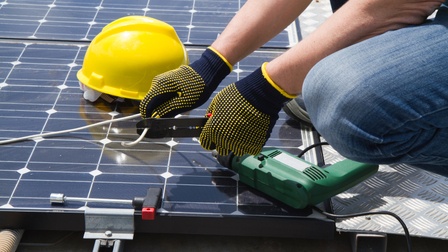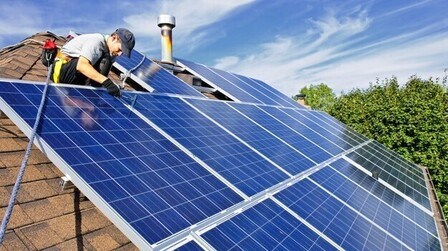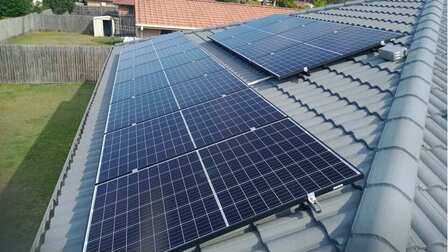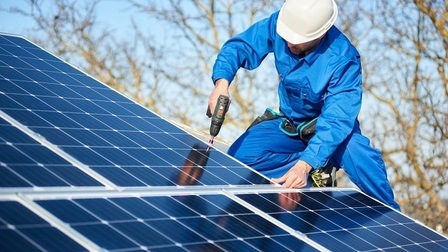Much as solar panels will not demand a lot of aftercare after installation, it is very necessary to clean your solar panels. All thanks to rainwater, air-borne particles like dust, pollen, debris, and more are usually washed off with ease. However, more stubborn dirt such as grime, soot, oil, and bird droppings will seldom come off unless you take time to hand wash the panels.
The bad news, the dirt on the surface significantly cuts the productivity of the solar panels. The good news is, washing off the dirt is not overly complicated if you love to DIY. Ahead, we have a complete guide to getting your panels cleaned and spotless.

How Often Should You Have Your Solar Panels Cleaned?
Experts recommend that you shouldn’t take more than 6 months before washing your panels. However, people dwelling in areas with infrequent rainfall should clean the panels a little more often. Also, if you reside in dusty regions like fields, or places with higher air pollution, such as industrial areas, busy highways, airports, or construction sites, you should clean the panels more frequently, every 2 – 4 months.
The built-up dirt comes in the way of sun rays and prevents the light from reaching the photovoltaic cells in the panel. The dirt will also reflect sunlight away from the solar panels. More than that, the grime will also affect heat dissipation and lead to an increase in temperatures. The high temperatures prevent the free flow of electrons and reduce the average performance of the panels. The result is a considerable reduction in the energy production efficiency of the PV system.
Steps to Clean Solar Panels
Below is a roundup of the equipment you will require and the best way to clean solar panels on the roof.
What you need
- Bucket
- Water hose connected to a running tap
- Soft cloth or sponge
- Soft scrubber or brush
- Squeegee covered with a dry cloth
- Mild soap
- Extendable stick
If you are not in a position to purchase the best solar panel cleaning equipment, you can use window washing tools.
Follow these steps to clean solar panels:
1 - Read the Instructions Manual
Before you begin to clean, take time to carefully read the manufacturer's manual for information on installation, safety, maintenance, and warranty. Having this information reduces the chances of damaging the panels, voiding your warranty, and enhances your safety. Some manufacturers will also specify the most effective way to clean your solar panels.
2 - Inspect the Panels
Take time to check the panels for dirt, dust, and debris. Identify the pesky and persistent dirt-like bird droppings. Even more, always monitor the system and ensure that it is functioning properly. If you start to notice a change in the energy production efficiency, it could be time to clean the panels.
3 - Choose the Appropriate Time
Never clean the panels when they are hot. Cool water can easily cause the glass to crack. Do the cleaning during a cool, overcast time of the day, ideally in the morning or evening.
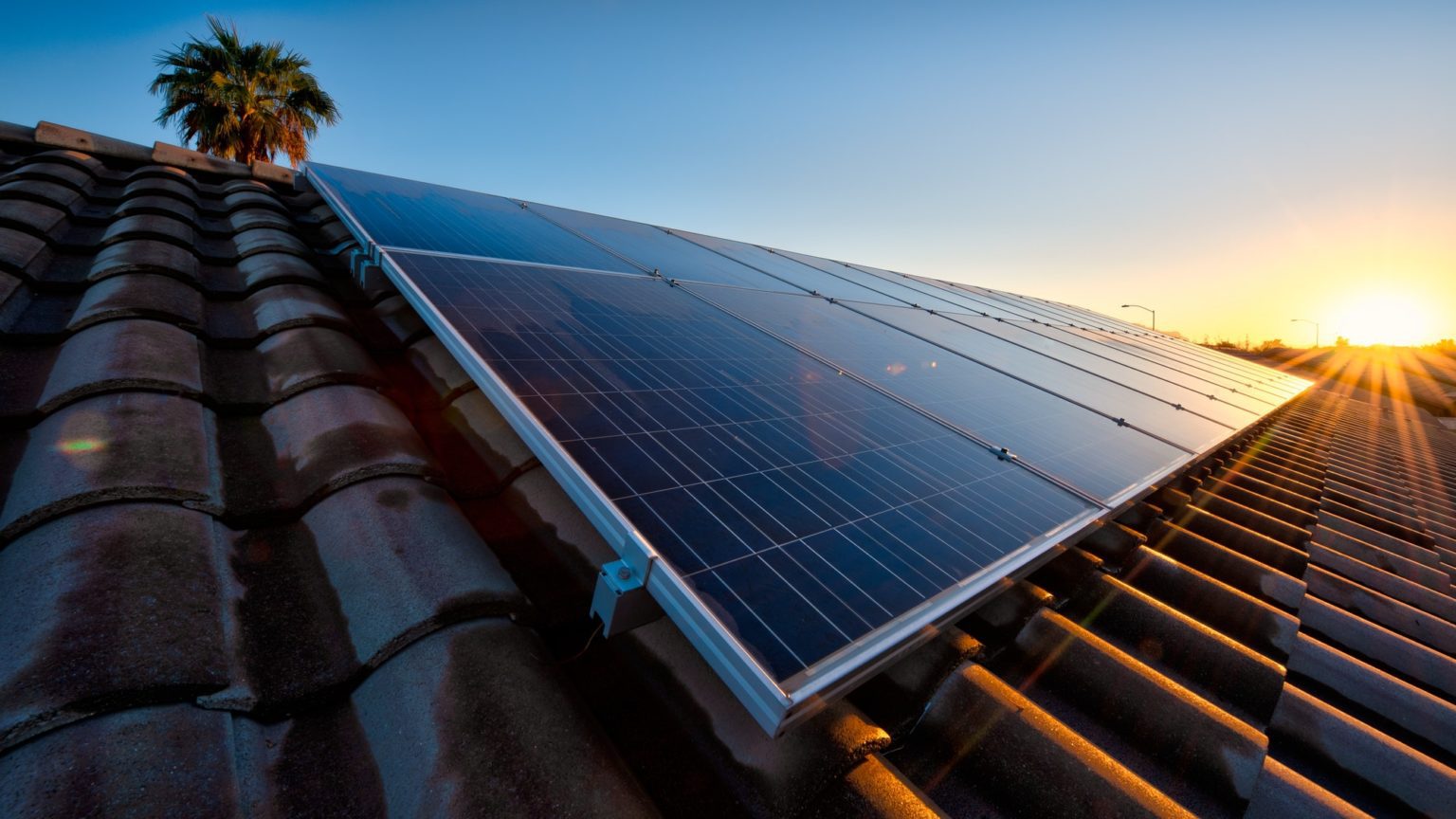
4 - Shut Down the PV System
Make sure your entire PV system is shut down before you begin the cleaning. Switch off the DC system from the inverter and turn off the AC systems from the Solar Supply Main Switch.
5 - Observe Safety
If you do not have the necessary safety equipment, consider working from the ground. Use a hose with a compressed nozzle to discharge water up to your panels. Along with that, attach the cleaning cloth to a long extension, and wash the panels safely from the ground.
Working from a watery roof poses the risk of slipping and falling over especially if the roof is very high or too steep. If you intend to climb over to the roof and do a thorough washing, use safety tools and fall protection gear. You will need a harness, ropes, safety glasses, boots, and a helmet.
6 - Disconnect any rain collection systems
Disconnect or block off gutters temporarily if any to prevent dirty run-off water from flowing into the storage tank.
7 - Cleaning

After making sure that you have observed all the procedures we have highlighted in the upper sections, you can then get down to cleaning the panels.
- Put clean water in a bucket and add a tiny bit of mild soap.
- Rinse the panels with a soft stream of water from a garden hose to remove loose dirt such as leaves. Never use a pressure washer to clean solar panels due to the risk of damage.
- Dip the soft cloth or sponge in the bucket with soapy water and smoothly glide it across the solar panels. If the dirt is persistent, use a soft non-abrasive scrubber or brush to gently wash off the stubborn dirt.
- One more time, rinse the panels with clean water from the hose. The water must be clean since dirty water will leave behind water spots and streaks.
- Run the squeegee to remove any water remaining on the panels. If you can still see some visible dirt, repeat the procedure until the grime comes off.
Solar Panel Maintenance FAQs
Do dirty solar panels generate electricity?
Dirty solar panels will still generate electricity. Even so, the efficiency of the PV system reduces significantly when the panel is dirty since the dirt stands in the sun’s way of the panels and prevents light from reaching the PV cells. A year’s buildup of dirt could reduce the efficiency of your PV system by up to 5%.
What is the maintenance cost of solar panels?
An average 2kw home solar energy system will set you back around $200 – 700 in annual maintenance costs. The price depends on your location, amount of dirt on the panels, size of the array, the proximity of the company to your home among others.
Solar maintenance companies will charge about $10 per solar panel. The maintenance includes periodic cleaning to remove dirt, regular inspections to look out for corrosion, wear and lose wiring and bolts, and tree trimming to prevent shading.
Can I clean solar panels with Windex?
Very small amounts of Windex can be used to clean stubborn dirt off the surface of solar panels. However, Windex usually contains a small number of colored additives such as detergents that may leave a residue and reduce the amount of light passing through.
Then again, Windex takes a lot of time to dry and may force you to wipe down the solar panels after cleaning. To save yourself the trouble, consider getting an outdoor Windex solution. Read the manufacturer's instructions before using such chemicals.
Do solar panels need to be washed?
Solar panels need to be washed from time to time. For the panels to work efficiently, they need to be free of debris and dirt. Dirt like dust, pollen, debris, grime, soot, oil, and bird droppings usually find their way to the panels and settle on the surface. Such dirt does not come off easily when it rains and will require hand washing to remove.
The dirt then blocks sun rays from reaching your solar panel and reduces the energy production efficiency of the solar panels. Dirt on the surface of the panels also reflects sunlight away from the solar panels while also affecting heat dissipation and causing an increase in temperatures of the array. Very high temperatures prevent the free flow of electrons and lower the average performance of the PV system.
Can you use vinegar to clean solar panels?
The answer is yes! Naturally, vinegar is an excellent cleaning agent that can be used to remove dirt from glass and metal surfaces. You need to mix a half cup of mild and non-abrasive detergent with ¼ cup of vinegar and add two cups of water. Put the mixture in a spray bottle and apply it to the areas of the panels with the dirt.
Can you walk on solar panels?
We highly discourage walking on solar panels. The glass layer on top of the panels is very fragile and easy to crack or scratch. Moreover, if the panels have any slight cracks, stepping on them coupled with expansion and contraction due to temperature changes may make the cracks expand. Cracks and scratches will deteriorate the power output of your solar energy system. And you do not want to spend extra money to replace damaged or cracked panels.
Solar panels are also very slippery making it easy to fall on them and break or damage the glass. Besides, you may also deposit dirt from your feet on the panels. This dirt may also reduce the panel’s efficiency.
How to Clean Solar Panels - Final Words
You will not just sit down and assume that the persistent dirt on the surface of your solar panel will run off with normal rainfall. You might be losing out on a great chunk of electricity because this dirt might be blocking out sunlight and having a toll on the efficiency of the panels.
Cleaning the panels is the solution to this loss. Thankfully, you have this write-up to guide you through the process. All you need to do is to hold to these helpful cues and you will be good to go.

